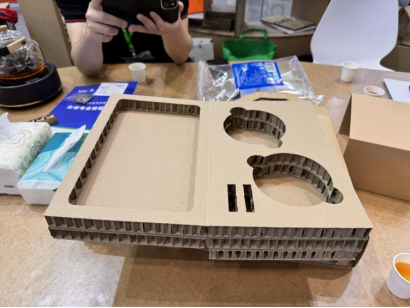







Have you ever wondered how packaging materials can be both strong and eco-friendly? Honeycomb cardboard is a sustainable solution that's gaining popularity in various industries. Made from recycled paper, it's lightweight, durable, and fully recyclable. In this post, we'll explore what honeycomb cardboard is, its benefits, and why it's a top choice for modern packaging needs.
Honeycomb cardboard consists of two outer layers and a hexagonal core. The core is composed of interlocking cells that create a strong yet lightweight structure. These cells work together to evenly distribute weight and pressure, which makes honeycomb cardboard highly effective in load-bearing applications. The outer layers are typically made from recycled paper or cardboard, ensuring both durability and environmental sustainability. This eco-friendly construction not only helps in protecting products during transport but also reduces the use of virgin materials. The hexagonal core structure allows honeycomb cardboard to be incredibly strong without the bulk of traditional materials like wood or solid cardboard. It offers an ideal combination of lightweight strength and stability, making it suitable for a wide range of industries, from electronics to automotive packaging. Its versatility means that it can be used for both fragile items and heavy-duty applications, such as industrial products, without compromising safety or protection.
The process of making honeycomb cardboard begins with bonding layers of paper into a honeycomb pattern. First, a layer of paper is glued into parallel strips, which are then expanded into hexagonal cells. The core of the honeycomb is then bonded to two flat outer sheets of paper. Adhesives are used to ensure the layers stick together, and the entire structure is cured to create a stable, durable panel. The thickness of honeycomb cardboard varies, typically ranging from 6mm to 160mm. The thickness depends on the desired strength and load-bearing capacity. Thicker panels provide greater strength and compressive resistance, while thinner panels offer lightweight solutions for less demanding applications. This flexibility in thickness allows honeycomb cardboard to be customized for a wide range of packaging and construction needs. The result is a lightweight, durable material that offers superior protection for products, reducing shipping costs and environmental impact.
Honeycomb cardboard is surprisingly strong for its weight, thanks to its unique hexagonal core. The interlocking cells in the core create a structure that distributes stress and weight evenly across the surface. This makes it resistant to bending and crushing, even under heavy loads. Unlike traditional cardboard, which can buckle and collapse under pressure, honeycomb cardboard’s design allows it to support much more weight without adding unnecessary bulk. This efficient use of materials makes it perfect for packaging both fragile items, like electronics, and heavier, more industrial products. The honeycomb structure’s ability to evenly distribute forces ensures that the material retains its strength even in challenging conditions. Additionally, the lightweight nature of honeycomb cardboard significantly reduces transportation costs by minimizing the weight of packaged goods. This combination of strength and lightness gives honeycomb cardboard a competitive edge over traditional cardboard and other packaging materials, making it highly desirable for industries that need a durable, cost-effective solution for shipping and storage.
One of the key advantages of honeycomb cardboard is its commitment to sustainability. Made from 100% recyclable paper, it helps reduce the need for virgin materials, which in turn lowers the environmental impact of packaging production. Honeycomb cardboard is fully recyclable and biodegradable, making it an environmentally friendly choice for companies looking to reduce their carbon footprint. Furthermore, its use of recycled materials in production and its ability to be recycled after use play a critical role in cutting down packaging waste. Unlike plastic or foam packaging, which are often non-recyclable and contribute to pollution, honeycomb cardboard is a sustainable alternative. By opting for honeycomb cardboard, businesses not only protect their products but also take a step towards a more eco-conscious future, helping reduce the global reliance on plastic packaging.

Honeycomb cardboard offers an excellent solution for reducing shipping costs. Its lightweight nature means lower transportation expenses, especially in air freight. Unlike heavier materials like wood or foam, honeycomb cardboard cuts down on weight without compromising strength. This weight reduction leads to significant savings in shipping costs, making it a more cost-effective option for businesses.
Despite its light weight, honeycomb cardboard is highly durable. Its unique structure allows it to absorb shocks and distribute pressure evenly. This makes it ideal for packaging both fragile and heavy items. Industries such as electronics, furniture, and automotive rely on honeycomb cardboard to protect goods during transport. Its stability and shock absorption properties prevent damage to sensitive products, even under heavy loads.
Honeycomb cardboard is used across various industries, including logistics, electronics, furniture, and automotive. It can take many forms, such as packaging, void fillers, and pallet stabilization materials. Its adaptability makes it a perfect fit for packaging fragile electronics, large appliances, and other sensitive products. Whether for cushioning or structural support, honeycomb cardboard provides versatile solutions for different needs.

Honeycomb cardboard and corrugated cardboard both serve as packaging materials, but they differ significantly in structure and strength. While corrugated cardboard has a fluted core between two outer liners, honeycomb cardboard features a hexagonal core that offers more stability with less weight. This makes honeycomb cardboard a better choice for heavy-duty applications, especially when protecting fragile or valuable items. Corrugated cardboard, on the other hand, is more cost-effective for lighter applications where strength isn't as critical.
When comparing honeycomb cardboard to foam packaging, one key factor is environmental impact. Foam is bulky, difficult to recycle, and contributes to landfill waste. Honeycomb cardboard, however, is made from recycled paper and is fully recyclable, making it an eco-friendly option. While foam offers good shock absorption, honeycomb cardboard performs similarly, offering impact protection while reducing environmental harm. In terms of sustainability, honeycomb cardboard has the edge, especially for companies looking to minimize their carbon footprint.
Honeycomb cardboard offers significant advantages over wooden pallets, particularly in terms of weight and ease of handling. Wooden pallets are heavy, can splinter, and pose safety risks. In contrast, honeycomb pallets are much lighter, easier to handle, and can be reused multiple times. Honeycomb pallets also have the advantage of being smooth and free from nails, making them safer for workers. For heavy loads, honeycomb pallets provide a more efficient, lighter alternative, reducing shipping costs and potential damage.
Honeycomb cardboard is ideal for the automotive industry, offering both strength and lightness. It’s often used for custom inserts that cradle large automotive parts like bumpers and fenders. The lightweight nature of honeycomb cardboard helps reduce shipping costs while providing the necessary stability for heavy-duty components during transport.
Honeycomb cardboard is a great alternative to foam for protecting furniture during transport. It’s commonly used as cushioning and corner protectors, preventing scratches and dents in delicate items. Unlike foam, honeycomb cardboard is cost-effective and offers solid protection, ensuring furniture remains stable and safe during shipping.
When it comes to shipping sensitive electronics or large appliances, honeycomb cardboard excels. Its shock-absorbing properties help prevent damage to fragile electronics like televisions and computers. For larger items like refrigerators or washing machines, honeycomb board provides additional stability, preventing vibrations and ensuring the safe arrival of goods.
In the food and beverage industry, honeycomb cardboard is used to separate and cushion glass bottles and produce. It protects items during shipping, ensuring they arrive intact while meeting sustainability goals. Beverage companies often rely on honeycomb cardboard to prevent breakage and provide an eco-friendly alternative to traditional packaging materials.
Honeycomb cardboard plays a vital role in improving shipping efficiency. It is commonly used in pallet sleeves and slip sheets to stabilize loads, preventing shifting and damage during transit. Its lightweight nature reduces the overall weight of shipments, cutting down on transportation costs and carbon emissions, making it a sustainable choice for businesses.
Yes, honeycomb cardboard can be customized to suit branding needs. It offers various printing options, allowing businesses to print logos, product details, and other branding elements directly onto the surface. Additionally, color customization is possible, enabling companies to match the packaging with their brand identity. This makes honeycomb cardboard an excellent choice for branded packaging, combining both functionality and marketing appeal.
Honeycomb cardboard can be tailored for different products through custom sizes and shapes. Whether it's a specific dimension for electronics or a unique insert for furniture, honeycomb cardboard can meet those needs. For industries like food or healthcare, moisture-resistant coatings are available to ensure the material stays strong and effective even in humid conditions. This versatility allows honeycomb cardboard to serve various packaging needs across multiple industries.
Honeycomb cardboard is a sustainable packaging option that helps companies achieve their environmental goals. Made from recycled materials, it’s fully recyclable, reducing packaging waste. By using honeycomb cardboard, businesses can significantly lower their carbon footprint. Its eco-friendly nature makes it a great alternative to plastic or foam packaging, further helping companies reduce their overall environmental impact.
Despite being lightweight, honeycomb cardboard is strong enough to support both light and heavy products. The hexagonal structure evenly distributes weight, preventing damage and ensuring stability during transport. Whether it’s fragile electronics or heavy industrial equipment, honeycomb cardboard provides the necessary protection without adding unnecessary weight. Its ability to handle heavy loads makes it a preferred choice for a variety of industries.
When it comes to shipping large volumes, honeycomb cardboard offers a cost-effective solution. Its lightweight design reduces freight charges, making it a budget-friendly choice for bulk shipping. Companies can save money on transportation while still ensuring that their products are safely packaged. Honeycomb cardboard combines strength and affordability, making it an ideal packaging material for businesses looking to reduce costs without compromising quality.
Honeycomb cardboard is revolutionizing packaging with its strength, lightness, sustainability, and versatility. Its ability to handle heavy loads while remaining eco-friendly makes it ideal for various industries. As companies focus on reducing costs and environmental impact, honeycomb cardboard is increasingly becoming the material of choice. Explore customized honeycomb cardboard packaging solutions today to improve your business’s efficiency and sustainability.
A: Honeycomb cardboard is stronger than traditional cardboard due to its hexagonal core, which distributes weight and stress evenly. It offers high load-bearing capacity while being lightweight, making it more efficient than materials like corrugated cardboard.
A: Yes, honeycomb cardboard can be customized with moisture-resistant coatings, making it suitable for packaging moisture-sensitive items such as food and medical products.
A: While the initial cost may be slightly higher than corrugated cardboard, honeycomb cardboard reduces shipping costs due to its light weight and durability. Long-term savings come from less waste and lower transportation expenses.
A: Honeycomb cardboard is highly durable. Its strength depends on the thickness, type of facing materials, and coating options. Thicker panels offer greater strength and compressive resistance.
A: Yes, honeycomb cardboard is versatile and used in industries such as automotive, electronics, furniture, food, and logistics. It provides custom solutions for a variety of packaging needs.